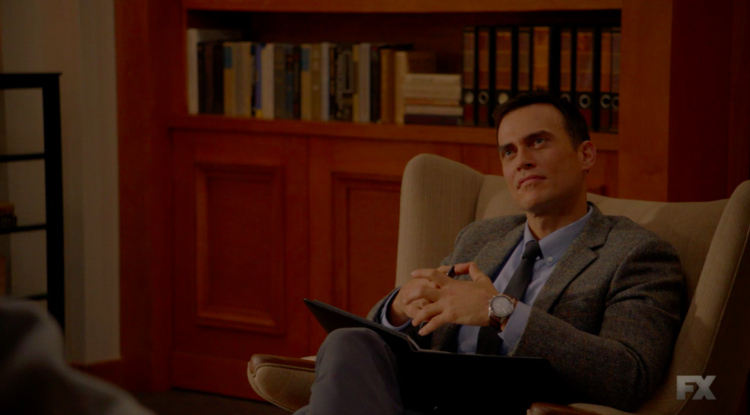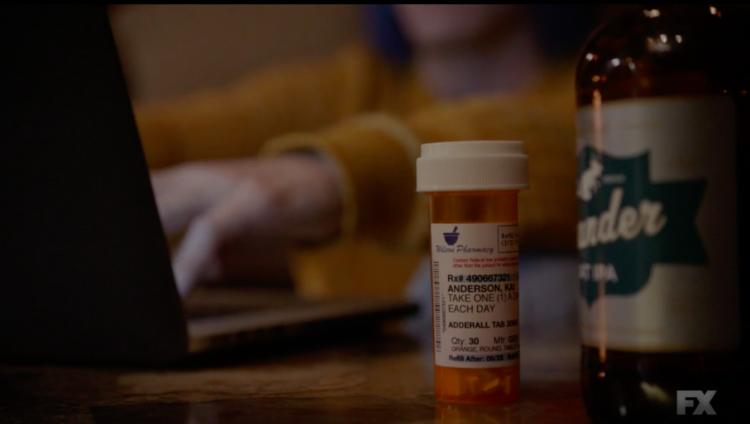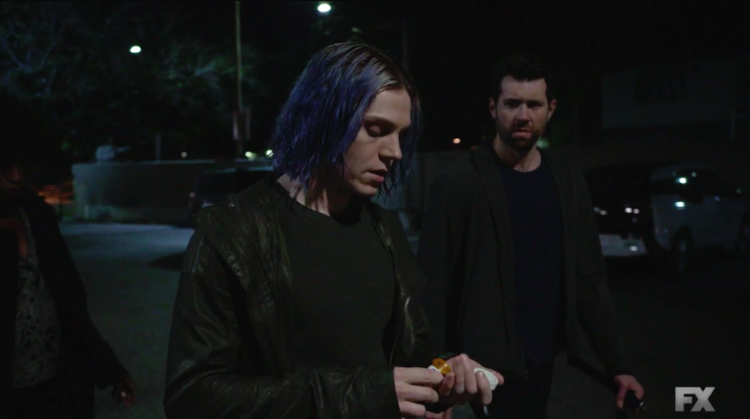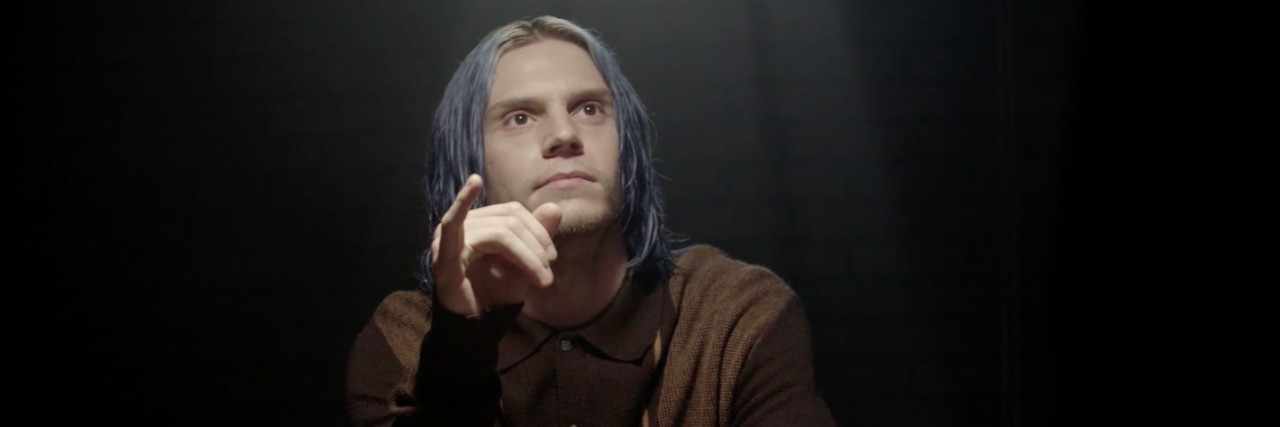Sometimes the news isn’t as straightforward as it’s made to seem. Juliette Virzi, The Mighty’s Associate Mental Health Editor, explains what to keep in mind if you see this topic or similar stories in your newsfeed. This is The Mighty Takeaway.
Editor’s Note: The following contains spoilers for and predictions of what will happen in “American Horror Story: Cult.”
It’s no secret “American Horror Story” has long paid homage to various horror tropes throughout history, taking cues not only from American horror, but also from classic Japanese and Spanish horror films. But now, in its seventh installment, “American Horror Story: Cult,” the show has continued to capitalize on classic — and in my opinion, unfortunate — stereotypes about mental illness in the horror genre.
Before diving in, let me preface by saying I’ve been and still am a fan of “American Horror Story.” But as I’ve watched “AHS: Cult,” I couldn’t help but question, should mental illness be in the horror genre at all?
“Cult” isn’t the first AHS season to incorporate mental illness into its plot. And while the show may have gotten away with it in the past by hiding behind over-the-top “campiness,” the reality is it’s a pattern that can’t be ignored.
Though there are many layers to mental illness stigma in the horror genre (AHS certainly isn’t the first or last show that will profit from it), most of the stigma in AHS results from a theme echoed through many of its seasons — don’t trust the psychiatrist.
Don’t Trust the Psychiatrist
“American Horror Story” has a history of depicting untrustworthy psychiatrists. From the philandering husband Ben Harmon in “Murder House” to the murderous Oliver Thredson from “Asylum,” psychiatrists don’t exactly have the greatest moral reputations in the AHS universe.
AHS didn’t invent this trope. Some other prime examples of “evil mental health professionals” include the well-known cannibal Hannibal Lecter from “The Silence of the Lambs” and Dr. Harleen Frances Quinzel, a.k.a. Harley Quinn in DC comics.
In a study of the demonization of psychiatrists in fiction, it was found that psychiatry is presented in an overwhelmingly damaging light.
It is these fictional portrayals of psychiatrists that present the most prevalent and readily accessible images of the profession to the general public. These are the damagingly negative, widespread representations that dominate the way in which psychiatrists are seen outside the world of medicine.
So why specifically do we see psychiatrists portrayed in this light?
I think the answer is multi-faceted, but I do believe the choice is intentional. First off, psychiatrists are doctors, a title which implies years of dedication studying the “inner workings” of the mind — which as horror films seem to suggest, is inherently suspect.

But perhaps more important is the fact that doctors are authority figures we are taught to respect unquestioningly — that is, unless they work in the mental health field. As the above study mentions, “Psychiatry has never enjoyed the respect and social prestige of other medical specialties,” because psychiatrists are often not viewed as “real” doctors.
And if we are to take the doctors on “American Horror Story: Asylum” as an example, people who have been “jilted” out of the respect they feel they deserve are dangerous and end up exerting control over marginalized people in society — in this case, people with mental illness.
This sentiment is echoed in the current season of AHS when cult leader Kai Anderson says, “There’s nothing more dangerous in this world than a humiliated man.”
Psychiatric Treatment Is Harmful, Not Helpful
Though “Cult” has humanized struggling with mental illness through Ally’s (Sarah Paulson) experience of anxiety, phobias and panic attacks, its been hinted throughout the season that Dr. Rudy Vincent (Cheyenne Jackson) has played a part in the realization of Ally’s fears.
We get this hint most clearly not from Ally’s situation in particular, but from what we see of another client’s interaction with Dr. Vincent.
In the beginning of episode three, “Neighbors From Hell,” we see the end of a therapy session where married couple Mark and Rosie meet with Dr. Vincent to discuss Rosie’s success in overcoming her phobia of confined spaces due to past trauma. When the couple returns home, Kai’s clown cult posse is waiting to lock them inside adjacent coffins — reawakening the fear she had just discussed overcoming.
Sounds like there was a breach of doctor-patient confidentiality, no?
This scene, along with the realization of Ally’s worst fears in previous episodes, hint that the psychiatrist may have a greater role in the cult than we might have first realized.
Dr. Vincent’s likely involvement with (or as I predict — leading of) the cult casts a negative light on psychiatric treatment. Rather than showing a mental health professional engaging in treatment to help a patient, the professional is consistently shown engaging in treatment to hurt the patient. This trope makes therapy a tool of manipulation, not treatment.
When people are shown again and again they cannot trust mental health professionals, it’s no wonder people are hesitant to seek help for their mental health. As the study on demonization of psychiatrists in fiction found, practicing psychiatrists are often regarded with suspicion and fear by others.
But the abuse of psychiatric treatment is not a new theme in “American Horror Story.” As fans may remember, “AHS: Asylum” humanized the psychiatric patients to a certain extent, but demonized psychiatry in general by showing clinicians performing barbaric experiments and using stigmatized psychiatric treatments as punishment — clearly taking a cue from Ken Kesey’s “One Flew Over the Cuckoo’s Nest.”
Medication Is Bad News
But perhaps the most disheartening part of this season I’ve seen so far is the way medication is portrayed. Many of the recaps you can find online about “Cult” episodes don’t mention this, but it’s important we talk about the implications.
The first time we see Kai’s medication is in episode four, entitled “11/9.” The scene opens with Kai watching news reporter Beverly cover the news of finding a headless torso (the body of the man Kai “motivated” Harrison to kill) in a landfill. As he continuously rewinds and re-watches Beverly, the music turns ominous and he reaches to his pocket to grab his medication, chewing on the pills as he watches her.
The next shot (pictured below) has the camera fixed on the his medication before panning up to Kai’s face. This shot tells us two things: 1. Kai’s name is on the bottle, so he was prescribed this medication, and 2. he’s taking Adderall.

In this scene, we see Kai decide to pursue Beverly as a cult member after watching a YouTube video that began with the text: “The following are the incidents that forced Michigan newscaster Beverly Hope of WNBR channel 7 to be driven to commit a savage act of violence.”
The scene seems to suggest that once Kai has taken the medication, he is excited by the prospect of a fellow aggressive person to adopt into the cult.
Think it’s a coincidence?
This idea is echoed again in episode five, “Holes” when Kai speaks to the cult before they brutally murder Bob, Beverly’s boss. “It’s about spreading terror,” Kai says after he nonchalantly pops pills in his mouth (pictured below).

It’s significant that Kai is shown taking medication when he’s excited by the prospect of violence because it reinforces the narrative the media presents about the link between medication, mental illness and subsequent violence.
According to the American Addictions Center website, aggression could be a long-term effect of heavy Adderall use, but information on this topic is limited, and drawing this association in the episode could be damaging to people who rely on psychiatric medication.
Because the show implies medication is a factor in Kai’s violence, we are then confronted with the question, who prescribed it?
And all signs yet again point back to the psychiatrist.
Dr. Vincent, who we find out is Kai’s older brother, is a psychiatrist we have seen prescribe medication to another patient — Ally.
But Ally is wary of the medication and doesn’t take it. And as the season goes on, this becomes a “good decision” because as we see, members of the cult and her psychiatrist try to convince her the things she’s seeing and experiencing are “all in her head,” when in fact they are really happening.
In juxtaposing the way Kai and Ally use (or don’t use) medication, it is implied that it’s good to be wary of psychiatric medication because a) the psychiatrist can never be trusted and b) any treatment given to you by said psychiatrist will be used as a means of control.
So where does this all leave us as viewers?
The way horror films depict psychiatry is such a big deal because these stereotypes don’t stay confined to the film genre. People carry these stereotypes with them — whether they realize it or not — and it can have an effect on help-seeking behavior.
It’s popular to hate psychiatry because as stigma suggests, its basis is in manipulation, not a real desire to help people.
But aren’t we tired of this trope?
In my opinion, the scariest part of “Cult” is that the cult members are normal people who have been manipulated into committing terrible crimes (in clown costumes, no less) in the name of “revolution.” To me, the true horror in the show comes from how we as humans can be vulnerable to the “mob mentality” and may easily be lulled into a sense of safety without realizing the implications of our actions. To me, this is much scarier than perpetuating tired tropes about mistrust of mental illness and mental health professionals.
Ryan Murphy, I love your work and I respect all that “American Horror Story” has brought to the horror genre, but please, let’s skip the stigma — we already have plenty to go around.
“American Horror Story: Cult” airs on Tuesdays at 10 p.m. (ET) on FX.
Photos via FX

